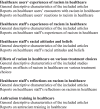Racism in healthcare: a scoping review
- PMID: 35578322
- PMCID: PMC9112453
- DOI: 10.1186/s12889-022-13122-y
Racism in healthcare: a scoping review
Abstract
Background: Racism constitutes a barrier towards achieving equitable healthcare as documented in research showing unequal processes of delivering, accessing, and receiving healthcare across countries and healthcare indicators. This review summarizes studies examining how racism is discussed and produced in the process of delivering, accessing and receiving healthcare across various national contexts.
Method: The PRISMA guidelines for scoping reviews were followed and databases were searched for peer reviewed empirical articles in English across national contexts. No starting date limitation was applied for this review. The end date was December 1, 2020. The review scoped 213 articles. The results were summarized, coded and thematically categorized in regards to the aim.
Results: The review yielded the following categories: healthcare users' experiences of racism in healthcare; healthcare staff's experiences of racism; healthcare staff's racial attitudes and beliefs; effects of racism in healthcare on various treatment choices; healthcare staff's reflections on racism in healthcare and; antiracist training in healthcare. Racialized minorities experience inadequate healthcare and being dismissed in healthcare interactions. Experiences of racism are associated with lack of trust and delay in seeking healthcare. Racialized minority healthcare staff experience racism in their workplace from healthcare users and colleagues and lack of organizational support in managing racism. Research on healthcare staff's racial attitudes and beliefs demonstrate a range of negative stereotypes regarding racialized minority healthcare users who are viewed as difficult. Research on implicit racial bias illustrates that healthcare staff exhibit racial bias in favor of majority group. Healthcare staff's racial bias may influence medical decisions negatively. Studies examining healthcare staff's reflections on racism and antiracist training show that healthcare staff tend to construct healthcare as impartial and that healthcare staff do not readily discuss racism in their workplace.
Conclusions: The USA dominates the research. It is imperative that research covers other geo-political contexts. Research on racism in healthcare is mainly descriptive, atheoretical, uses racial categories uncritically and tends to ignore racialization processes making it difficult to conceptualize racism. Sociological research on racism could inform research on racism as it theoretically explains racism's structural embeddedness, which could aid in tackling racism to provide good quality care.
Keywords: Discrimination; Healthcare; Racism; Review.
© 2022. The Author(s).
Conflict of interest statement
The authors declare that they have no competing interests.
Figures





References
-
- Bonilla-Silva E. Rethinking racism: Toward a structural interpretation. Am Sociol Rev. 1997;62(3):465–480. doi: 10.2307/2657316. - DOI
-
- Omi M, Winant H. Racial Formation in the United States. 3. New York: Routledge; 2014. p. 344.
-
- Bonilla-Silva E. Racism without Racists: Color-Blind Racism and the Persistence of Racial Inequality in America. 3. Lanham: Rowman & Littlefield Publishers; 2009. p. 318.
Publication types
MeSH terms
LinkOut - more resources
Full Text Sources

